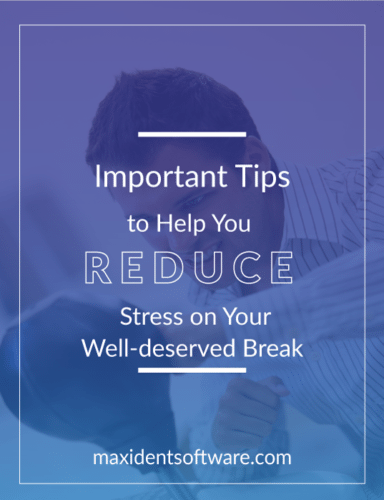
It’s summer! Finally! Two days ago, we celebrated the Summer Solstice also known as the longest day of the year. If you haven’t yet taken your vacation and you’re suddenly having dreams about work, it’s definitely time to start planning. I bet you already have something in mind– whether you plan on a vacation out of the country or a stay-cation at home. But have you thought about the stress that can come with a vacation or stay-cation? Believe it or not, sometimes your well-deserved break can come with more stress than work. That is why I am going to arm you with a few tips for both your vacation and your stay-cation that will guarantee a significant reduction in stress and a much more relaxing break.
Tips for your vacation:
Plan it out
If you’re planning on leaving the city, the province, or the country, the best thing you can do to reduce stress is planning it out. Five years ago, I enjoyed a vacation in Europe. It was my first time and I was terrified of all the potential issues I could run into. I can’t say it was a completely stress-free vacation, but I allayed a lot of my fears by simply preparing for the trip as much as I could. This included booking the flights, booking the hotels, and booking the activities. Oh yes, if you’re going somewhere exotic and you want to visit the Colosseum or stand on the Spanish steps or tour St. Paul’s Cathedral, the way to avoid lines and therefore stress is by doing your research and planning each of these activities in advance. I did it and it was worth the time I took doing it, especially when I arrived at the Colosseum early to see that the line stretched around the attraction, guaranteeing either a missed opportunity or hours wasted in the line.
Did you know that some of the motels and hostels in Europe have community toilets? Did you know that you have to pay to use the washroom outside of your hotel? Do you know what the weather is like and that some places in France experience rain 75% of the time? I am not kidding. Do your research well in advance and you are guaranteed to enjoy a worry-free holiday.
Prepare for things to go sideways
Life happens, which means things aren’t always going to go to plan, so always prepare for the worst. In Mental Floss’ article, they list a few very important points to keep in mind when traveling:
- If you plan on using the car rental insurance that comes with your credit card, research what’s actually covered. Most have limitations.
- Don’t assume English is spoken everywhere you go. Research local customs before you leave and download a translation app just to be on the safe side.
- Make sure you know your airline’s rules for traveling with children or pets. Many airlines charge extra for everything from picking a seat to printing your ticket at the airport.
But also remember to take it all in stride. Things happen. Life wouldn’t be what it is if we didn’t take the good with the bad. The bad just makes the good that much better. I had my fair share of bad experiences in Europe — everything from getting lost in France on the way to the Eiffel Tower, nearly getting crushed to death on New Year’s Eve just trying to get to the metro station, Missing the last bus in London, and surviving for three days in constant rain with no heat in Quimper, France. Here’s what you need to remember about the bad times: they make the good times even better, and what’s more, they make great stories to tell everyone at the office when you return.
Put space between work and your trip
I am sorry, but work is much too close to the end of your trip. You need space. It may have been a relaxing two weeks, but you need to adjust now. You probably still have jet lag. You are also mentally and physically exhausted. You had fun, you got to relax, and you have a ton of stories to share, but going back to work directly after your vacation is a big no-no. Speaking from experience, you will come to work tired and miserable. The point is to recharge, not come back feeling worse than before you left. Put at least a few days between the end of your vacation and the day you go back to work so that you can take a break at home to relax and adjust.
Tips for your stay-cation
Do not worry about work
It is so easy to get dragged back into that work frame of mind. You feel the urge to check your email, call the office, or check voicemail; but you don’t want to be a prisoner to the job. Free yourself by shutting off your phone, closing out your email and ignoring any urge to check in. In fact, a week before your break starts, slowly bring yourself into vacation mode and start preparing to relax.
Limit your itinerary
Even on your stay-cation, there is a good chance your days off will be booked. It’s like everyone around you suddenly knows you have time and start making their requests to see you, to hang out, to help them out with something. Lifehacker.com’s article suggests that we “learn to say no” and even though the context of this is in regards to being too busy to take breaks at work, it can easily apply to the people in your life who want to consume all your time as well. There is absolutely nothing wrong with spending time with friends and loved ones, but at a point, you need time specifically for you in order to relax and breathe.
Relax (actually relax)
Speaking of relaxing, the point here to actually relax. To be fair, relaxation comes in different forms. Sometimes it’s doing absolutely nothing or binging an entire season of a TV show on Netflix or napping on and off; however, if you’re like me, the only way to really relax is to be doing something, anything, and keeping busy.
Here’s the trick to that. Being busy is not relaxing, but being busy with something you love to do– a hobby, a passion– is. Take a moment to think of something you alone want to do– ignore all the outside noise, it doesn’t matter. What do you want to do? What activity do you think about that has the ability to make you smile, even when just thinking about it? Whatever that activity is, that is what you should be doing to relax. I relax by writing. And not by writing to impress or writing materials for work– but writing what I want just for me and no one else. That’s the difference. No pressure. No stress. No deadline.
Relax on your terms and enjoy your vacation (or stay-cation) the way you want to enjoy it.
Conclusion
Taking a well-deserved vacation is vital to your health and wellbeing. It reduces stress, prevents burnout and gives your mind and body a chance to recharge, allowing for greater production when you return to work. But I’m not done because the problem of putting a vacation on hold or not actually relaxing once you’re on it is not the only problem in this society of go go go. The problem comes after you return from vacation and jump right back into your high-pressure, high-stress work life. The vacation should not just stop. Don’t think that you’ve had your week or two weeks to recharge and that’s it. That’s not it. Take breaks on a regular basis even if it’s just for an hour or two every day. Always, put you first and find time to relax even after the vacation is over.
For more advice about vacation preparation or for more ways to relax, enjoy the links below.
Resources
- Mental Floss: 5 Tips for Preparing for an Epic Vacation
- The Huffington Post: How To Prepare Yourself For The Perfect, Stress-Free Vacation
- Reuters: What your credit card covers for car rentals
- Lifehacker: How You Can Learn to Finally, Really Relax
Suggested Page:



